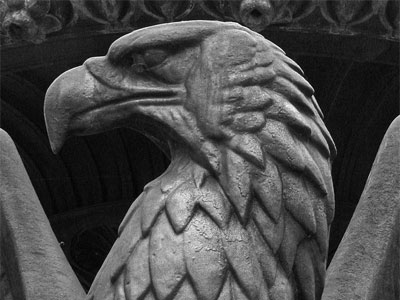A Reply to James Perry
The reviewer misplayed a few points on my new book, Flight of the Eagle.
 Thanks to James Perry for his generally favorable review of my book Flight of the Eagle, which, however, incites three clarifications. Mr. Perry leads with the fact that I was convicted on two criminal counts and sent to prison for three years in the United States, as if this were a mystery or a fact that should affect a review of my book. If he felt he had to broach the subject he might have pointed out that the prosecutors were seeking life imprisonment and fines and restitution of $140 million, and that all seventeen counts were abandoned, rejected by jurors or unanimously vacated by the U.S. Supreme Court, although two were self-interestedly retrieved by lower court judges whom the high court excoriated but to whom it remanded the vacated counts for the assessment of the gravity of their own errors. In no other civilized country in the world would such a process count as a conviction, and in Canada I received the largest libel settlement in that country’s history from the authors of the original complaint against me. I consider the whole episode a matter of pride and not embarrassment.
Thanks to James Perry for his generally favorable review of my book Flight of the Eagle, which, however, incites three clarifications. Mr. Perry leads with the fact that I was convicted on two criminal counts and sent to prison for three years in the United States, as if this were a mystery or a fact that should affect a review of my book. If he felt he had to broach the subject he might have pointed out that the prosecutors were seeking life imprisonment and fines and restitution of $140 million, and that all seventeen counts were abandoned, rejected by jurors or unanimously vacated by the U.S. Supreme Court, although two were self-interestedly retrieved by lower court judges whom the high court excoriated but to whom it remanded the vacated counts for the assessment of the gravity of their own errors. In no other civilized country in the world would such a process count as a conviction, and in Canada I received the largest libel settlement in that country’s history from the authors of the original complaint against me. I consider the whole episode a matter of pride and not embarrassment.
On more matters more relevant to the book, Mr. Perry appears to debunk Douglas MacArthur as a military commander because he led the liberation of the Philippines and Max Hastings, who worked for me (quite satisfactorily) at the London Daily Telegraph for seven years, thinks that Roosevelt and Marshall should not have bothered with that operation; and because MacArthur relied on the assurance of military intelligence that the Red Chinese would not intervene in Korea. MacArthur conducted a brilliant defense of the Philippines in 1942, defeating the invasion in Bataan for a month, and carried out his orders to retake the islands with his usual skill and thoroughness. And what Max Hastings thinks of the command decision to order MacArthur to retake the islands is scarcely relevant. I severely criticize the intelligence blunders in Korea, but they do not erase the fact that MacArthur’s complete destruction of the North Korean army in the two weeks following the Inchon landing in 1950 was one of the greatest military successes in American history.
As for Mr. Perry’s allegation against me of a “serious blunder” in crediting Richard Nixon with a combat role in World War II, he did conduct his supply role under heavy Japanese air bombardment at times, at Bougainville and on Green Island, with bravery and efficiency, for which he was awarded two battle stars and a written commendation from his commanding officer.
Conrad Black
Toronto
Image: Flickr/Roberto Ferrari. CC BY-SA 2.0.
